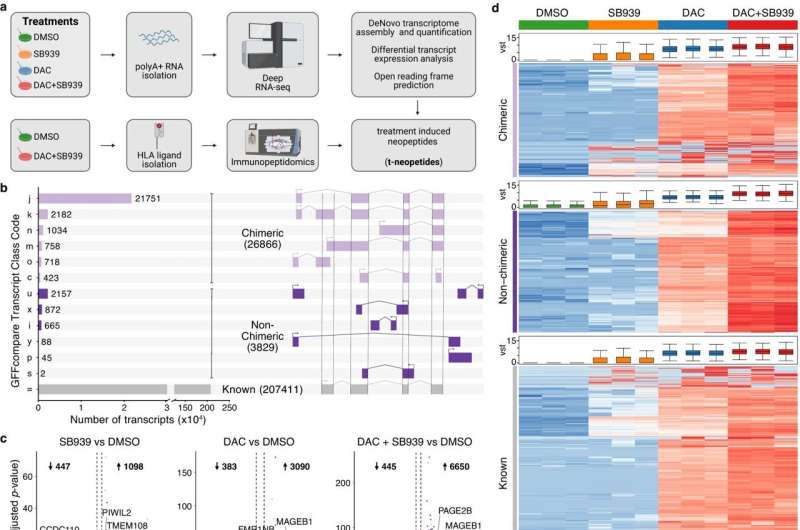This article has been reviewed according to Science X's editorial process and policies. Editors have highlighted the following attributes while ensuring the content's credibility:
fact-checked
peer-reviewed publication
trusted source
proofread
Epigenetically acting drugs could support cancer immunotherapy

Epigenetically active drugs enable the cell to read parts oft he genome that were previously blocked and inaccessible. This leads to the formation of new mRNA transcripts and also new proteins, as scientists from the German Cancer Research Center and the University Hospital Tübingen have now described in research published in Nature Communications. These "therapy-induced epitopes" could help the immune system recognize cancer cells.
Immunotherapies are an integral part of the treatment spectrum for many types of cancer. However, not all patients benefit from them. One of the reasons for the failure of this form of treatment may be that the patient's immune system does not recognize the cancer cells as such. A fundamental prerequisite for the success of these therapies is that cancer cells carry protein structures, known as antigens, on their surface by which the T cells of the immune system can distinguish them from healthy body cells.
Such antigens can be cancer-associated proteins ("tumor-associated antigens") or proteins modified by mutations. However, they can also be completely new gene products that arise in tumor cells because completely new areas of genes are read.
Scientists led by Christoph Plass, DKFZ, and Juliane Walz, University and University Hospital Tübingen, have now come up with an idea to make cancer cells even more visible to the immune system: They equip the cells with completely new antigens—with the help of epigenetically active cancer drugs.
These drugs are prescribed for many types of cancer. They act on the so-called epigenetic marks on the DNA or on DNA packaging proteins, the histones. Epigenetic marks determine whether or not the cell can translate certain parts of its genome in mRNA.
These agents include demethylating drugs such as Decitabine or the HDAC inhibitors. They cause previously blocked, inaccessible regions of the genome to be read, thereby creating new mRNA transcripts in the cell.
Treatment of a lung cancer cell line in the culture dish with decitabine and HDAC inhibitors actually induced several thousand new transcripts, Plass's team found via RNA analysis. The majority of these new transcripts originated from endogenous retroviruses.
These sequences, which account for up to 8% of the human genome, are considered relics of retroviral infections from long ago. Normally, their transcription is blocked by epigenetic mechanisms. The effect of the neoepitopes induced by Decitabine and the HDAC inhibitors is much stronger in cancer cells than in healthy cells. Experts believe that the reason for this difference is the high proliferation rate of cancer cells.
The exciting question now was whether these "therapy-induced transcripts" actually code for immunogenic protein segments, so-called peptides. The team, led by Juliane Walz, tested this using mass spectrometry. The researchers were thus able to identify 45 "neoepitopes" that were presented on the surface of the cancer cells after treatment. The researchers were able to achieve comparable results with a large spectrum of different cancer cell lines. The therapy-induced neoepitopes could be used to activate cytotoxic T cells in the culture dish.
Decitabine is widely used for the treatment of acute myeloid leukemia (AML). The researchers also detected therapy-induced neoepitopes in the blood of AML patients receiving Decitabine therapy—an important indication that this phenomenon is not an artifact from the culture dish.
"The induction of neoantigens by epigenetic agents could be a new way to use drug combinations to increase the efficacy of cancer immunotherapies. With further studies, we want to find out whether it is possible to develop targeted immunotherapies against these neoantigens," says study leader Christoph Plass.
More information: Ashish Goyal et al, DNMT and HDAC inhibition induces immunogenic neoantigens from human endogenous retroviral element-derived transcripts, Nature Communications (2023). DOI: 10.1038/s41467-023-42417-w



















